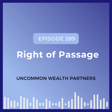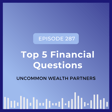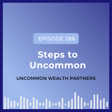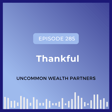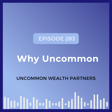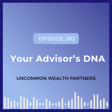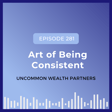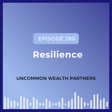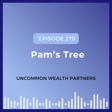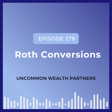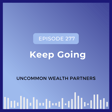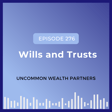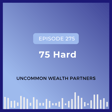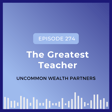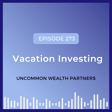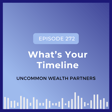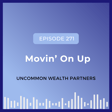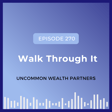Become a Creator today!Start creating today - Share your story with the world!
Start for free
00:00:00
00:00:01

Independence
Josh Nielsen, the creator of Zencastr, shares his journey of building a successful publishing company for podcasters. Looking to create both financial and geographical independence for his family, he initially started the company to solve the problem of remote recording for podcasters, but as the podcasting industry grew, Zencastr expanded its services to include hosting, distribution, audience growth, and monetization.
Josh discusses the challenges he faced along the way, including the need to hire a team and manage the growth of the business. He emphasizes the importance of finding satisfaction beyond financial success and the value of helping others achieve their goals.
Recommended
Transcript
Introduction to Uncommon Wealth Podcast
00:00:00
Speaker
Everyone dreams of living an uncommon life and the best asset you have to achieve your dreams is you. Welcome to the Uncommon Wealth Podcast. We're going to introduce you to people who are living uncommonly. We're also going to give you some tools and strategies for building wealth and for pursuing an uncommon path that is uniquely right for you.
00:00:26
Speaker
Hello and welcome everybody to another episode of the Uncoma
Introducing Joshua Nelson and Zancaster
00:00:29
Speaker
Wealth Project. I'm your host, Phillip Ramsey. And I'm Aaron Kramer. We have a fun one for you today. Do we not, Aaron? It's a big one. I know. If you've heard, or even in the podcast space, you've probably heard of Zancaster, but you probably don't know the person that helped create or actually created Zancaster. What we do, and his name is Joshua Nelson. Thanks for being on the show. How are you, man? I'm great. Thanks for having me. Glad to see you guys chat with you guys today.
00:00:55
Speaker
Yeah. So we kind of got to know each other a little bit before the show because we didn't know each other
Joshua's Journey and Initial Challenges
00:01:00
Speaker
before. But I feel like we're kindred spirits already. Yeah. So we're going to talk about all things. One, how to create something that you're passionate about. We're going to talk about his family. We're going to talk about maybe the struggles that he's had and maybe where things are going to go in the future. But let's start it out like, hey, what's the first question I'm going to ask? I never know either, Josh. So here we go. Did you ever think it was going to be as successful as it is?
00:01:26
Speaker
Um, no, period. Famous words, famous words. My, it started, I started off with totally kind of different ambitions and the, the original plan was, you know,
00:01:43
Speaker
I just need something to give financial independence to my family. I also wanted geographic independence. My wife, she lives in New Zealand and we were having a baby and I was going to have to travel there to do it there because she wanted to be with her family and it was hard to get hired. So there's a lot of factors just to suit our lifestyle that the business started around.
00:02:04
Speaker
But then, you know, as we get into this, but then, you know, we sort of caught a wave building a company and a growing market and got good early traction and then decided, hey, there's, you know, there's, there's a next stage to this once we got that original footing to then, you know, take this into building a much bigger business.
00:02:23
Speaker
Yeah, that's good. So our listeners may or may not be familiar with Zancaster. So Zancaster is the publishing company that kind of publishes our podcast. So without them, we probably wouldn't be hearing us in your ears or over your car speakers. You just wouldn't have heard. So Josh, thanks. You were the OG that put them all on the map. But from your own words, what is Zancaster for those listeners that may not have any idea what it is?
Creation and Purpose of Zancaster
00:02:47
Speaker
Yeah, so Zincaster is, you know, we've become a lot of things now, but our first entry into the market was solving the remote recording problem that podcasters had and still have, which is 80 plus percent of podcasters have either remote guest or remote co-host on their episodes. And how do you get really high quality recordings with someone that's not in the same room with you? And the problem was manifesting back then. Most people are using Skype. A lot of people now use Zoom, but
00:03:17
Speaker
The problem is if the internet at best is going to be compressing the audio and video because it only records on one end. At worst, if the internet connection is not great, especially back then, we're talking eight years ago, you can have dropouts, robotic sounding voices, and things that are really going to annoy the ears of the listener and that
00:03:39
Speaker
you know, means they're going to unsubscribe or they're going to flame you on Twitter. And that's a lot of what we were seeing. And so that was the entry to market was solving that problem. Make it so you can send a link to anyone anywhere in the world, opens them up in a Zoom like call. But when you hit record, it records you locally on your end, me locally on my end. And then we mix that together in the cloud after the fact. So you have that really great same room sound.
00:04:01
Speaker
Now we've expanded and we realize podcasters have a lot of other problems, hosting their content, distributing it, growing their audience, finding their audience, monetizing, all of these things. And so we've expanded into sort of a full service, all in one platform for podcast success.
00:04:18
Speaker
Yeah, it's super cool. And it's things that like, as you said, it's evolved, right? And so like, we would love to be sponsored by Acura. I don't know if you have any ideas, but you know, do what you do. But so what did you do before you did this? I love that you one created something because out of necessity and obstacles that you had to overcome. But what did you do before this?
00:04:38
Speaker
So by trade, I'm a software developer. I got my first, I just really enjoy programming and building things with code and making things that are useful.
From Software Developer to Startup Innovator
00:04:52
Speaker
And I ended up kind of drifting into the startup space. My first job at a university was a company in LA called Mahalo. It was a start, you know, funded startup and just kind of caught the startup bug. And I was seeing, I was helping other people build products
00:05:08
Speaker
I ended up working for a company called Techstars, which is a startup incubator in Boulder, Colorado, and got to help several companies get their products ready for demo day and pitching and funding and all that. I just thought, hey, maybe I could do this too. Instead of just helping other people build, I could come up with my own thing. That's sort of the space that I was in before all this.
00:05:36
Speaker
Um, I'm a very, very, very hobbyist musician. And I had some other friends who are in the same boat who were also engineers and designers. And we decided, Hey, let's build something for musicians, self work, collaborate together online, create license free content that you could remix and all of this stuff, which is a fun dream. Don't start a music startup. If you're thinking about it.
00:06:01
Speaker
I went to the one of the, um, like SF music tech summit back then. And the keynote address was like, who's does, is anybody making money? Like who has figured out how to make any money? And if you are come up here and give the keynote.
00:06:17
Speaker
You know, yeah, yeah, it was kind of a, there was a bit of desperation. And so I was like, okay, this is probably not the right space to try and build this. And so, uh, but as I was pitching that to different people, somebody along the way said, Hey, I don't know about musicians, but podcasters have this problem with their audio. And if you're already building audio type stuff, like maybe there's something there. And I actually.
00:06:43
Speaker
We were like, no, no, no, we're, this is our passion is this music thing. And, uh, ended up didn't work out team broke up. And, you know, I went my way and then come, you know, a few years later, I find out that I've got a baby on the way and I'm like, okay, I need to figure out like, what's a quicker path to revenue with what I know and what I've got that can, um,
00:07:06
Speaker
also, you know, be something else fun to work on. And I knew, I listened to podcasts and I had remembered that someone said, hey, maybe there's something here for podcasters. So I went and interviewed some podcasters, found out there was a real problem. The technology, it was just becoming available to actually really solve that problem. And so, bit of just kind of luck and good timing. So that's the short story of kind of what I was doing before and what led to, you know, the beginning of the company.
00:07:33
Speaker
Right. And then how much did you have to spend to say like, all right, like I think there's a need. Now I'm going to jump all into it here. What, what's that look like?
Balancing Act: Work, Startup, and Financial Risks
00:07:42
Speaker
So I, you know, I, I was not in a position to be able to raise money. Like I didn't have a track record. I didn't even know. I mean, I had, I had connections to investors, but they had much better opportunities than, you know, whatever.
00:07:57
Speaker
my tentative idea that I was working on. So I didn't even really try. I was, uh, but I just was working remotely, working for other startups. And, you know, I was able to charge enough that I could work like four to six hours a day and then, you know, just have the rest of that time to work on the business. And so I just didn't quit my job and I made sure I had jobs that I could, uh, work pretty flexibly. And then when I had to move, I ended up
00:08:28
Speaker
following my, I've been up following my wife. She had gone back to Australia. This is before we were married and followed her there. And then it was harder to get jobs when you're in that time zone. So I ended up, you know, actually taking a really drastic pay cut, but got a job that was super flexible and just like we have as much work as you want and you can be super flexible. And so, yeah. The things you do for love.
00:08:56
Speaker
Yeah, but it worked out, you know, like it gave me that time on the side to just work, you know, it was just, they knew I had this company and, uh, or that was this idea that I was working on. And so, um, yeah, that's how I did it without really doing too much. You know, we ended up, uh, having the baby in New Zealand later. And then we moved to Thailand.
00:09:19
Speaker
Oh, wow. And at that point I was like, okay, I actually need to focus on this to ship it because I had launched an alpha or I guess an open beta and there's thousands of people using it, but I still wasn't charging yet because I hadn't even built billing into the system and all that. And so.
00:09:37
Speaker
At that point I did taking a calculated risk and I just like applied for like three or four credit cards. That all at once. And my job and spent six months getting the billing system built and then kicked on the paid plans. That's awesome. How is that feeling for you? Like, you know, taking that leap. Um, it was scary. Um, but you know, I think,
00:10:02
Speaker
Luckily, it worked out. I don't recommend it. I mean, these are like these are like, you know, 25 percent. You know, these are not low interest rate. No. I could have gotten into a really bad situation. What was the conversation with your wife about that? Like, hey, we're going to do this. Good question.
00:10:20
Speaker
You know, she's always just kind of trusted me with that sort of stuff for better or worse. Um, so she's, she, she was happy to just, you know, she believed in whatever I, you know, I swear, I think this is time to do it. I need to focus on this because it was a one man team. It was, you know, I'd already been, I'd, I'd been working on it for almost two years, had, you know,
00:10:42
Speaker
people using it for almost that amount of time, you know, doing customer support, development, all that stuff. And so it just, it was time to do something. And, you know, I had a pretty good idea of solving a pain point. We were the first mover, really the first mover in that space. And so we had a lot of good early traction and luckily kicked on the paid plans
00:11:06
Speaker
Um, while keeping a freemium plan as well, or a free plan. And that first month, I think we get, went to like 17 K and MRR. And so, um, you know, the, the product is just naturally sort of, uh, hazard, an organic growth loop built into it. Cause you're using it with someone else. You're always bringing new people into the platform. And so that just kind of helped it grow from there. So yeah, lucky.
00:11:31
Speaker
We get to do this every day where we get to take people like you and take the proverbial leap off the bridge right and the scariest part before your parachute. Opens up is the momentum that happens before your parachute
Strategic Decisions and Growth
00:11:43
Speaker
is after you take a leap right but for you it's interesting i don't see that it was actually.
00:11:51
Speaker
Risky move here's why because you worked on it your risk tolerance was like I'm not gonna just burn every boat that I have just cuz a good idea No, you actually did the discipline and hard work of working on this as a side hustle right while you had cash flow on the other and then the second kind of
00:12:10
Speaker
step was then getting paid less when you're going after your wife, right? There's the second thing. So you're like slowly kind of decreasing the monthly expenses that you need in order for your Zancaster to actually get off the ground. And then so by the time you did it, you had two years of experience that people were using it, right? And so when you did finally cross over to the old credit card leap,
00:12:32
Speaker
Although be it you're right that's a high risk high reward kind of thing you had a two-year experience of just like not doing it cold turkey like we have people have a risk tolerance of like I'm ready I got an idea I'm ready to go and usually what we have to do at that point is really kind of unified the husband and wife at that time of like
00:12:51
Speaker
Yeah, but your spouse isn't ready for that. So how is it that you both can unify and both develop a financial plan or a financial roadmap in order that both feel comfortable? And I felt like you were naturally doing that. And that's probably why your wife is feeling comfortable with you is because you weren't going to be like, hey, babe, I got an idea. Let's rock. I got three credit cards. What do you think?
00:13:12
Speaker
You know, she's seen like experience in your history and your discipline. And then obviously like, yeah, I'd love to help you with that. That's the way you want to do it. And I feel like creating something on your own is so valuable. And I think a lot of people
00:13:27
Speaker
will immediately go to like, well, I need a partner or I need to take somebody else's money. And what we found is actually the opposite. If you can do it by yourself in, like you said, almost any means necessary, as long as you have proof of concept, it ends up being the best investment you ever have made.
00:13:46
Speaker
And so we're kind of at this point where like your parachute not only opened, but it opened in a magnificent, beautiful way. It was beautiful colors and it was huge. And it not only took you down to the ground, but it actually like caught a wind pocket and you're kind of floating up. So tell us after you've gotten through the credit card scare,
00:14:05
Speaker
When was it? Maybe it was the first month when you said you got 17,000 MMR. That was awesome. But when did you know like, oh, wow, we can even do more, right? Like, and then the fuel started kind of going. Tell us about that process. Yeah. I mean, when I started the company, podcasting was not a very sexy space. Like,
00:14:27
Speaker
They'd been around for, I don't know, 10, 15 years or something. It wasn't like a new technology. It wasn't growing particularly. It was a lot of just people that were doing it for the love of the game, not a ton of money in the space. But then as I was building it, and again, this wasn't like me seeing this in the future, this just happened. As I was building it and onboarding people into the application,
00:14:55
Speaker
Some things started to happen, like This American Life and Serial, if you remember that, one of the first two crime podcasts, they hit a milestone of getting a million downloads per episode. And that just kind of, everyone was like, whoa, podcasting is actually maybe going to be big. Nobody had ever heard of that before.
00:15:17
Speaker
That kicked off just a wave of interest. Within a year, you had everybody from Apple, Amazon, Google, I think even Facebook. They all were launching podcasting initiatives. Spotify obviously got very interested. That just
00:15:35
Speaker
You know, change the whole market and change the whole, you know, change the TAM of the company as well. I wasn't even thinking of it like that at the time, but and, you know, we got a lot more, you know, just we were growing faster. More people were trying to start their own podcast.
00:15:54
Speaker
companies like Spotify are saying we're going to spend a billion dollars in space in the next X amount of years. And so it was one. Hey, this is there's a wave here that we're actually on the tip of and be there's a bunch of companies with a bunch of money coming in here. And if we don't figure out how to like get our money and grow fast, we're going to have a chance of being pushed out of the space or pushed to the margins. And
00:16:19
Speaker
So that was what took it from being very much a lifestyle business into being. And I will also say that it grew too big. I really wanted to just be a solopreneur. I didn't want to like, that was my goal at least. And, but I found that there's just so many people using it that I couldn't keep up with product development, bug squashing and all the customer service and everything else. And it actually became very stressful.
00:16:46
Speaker
And so I was like, I need to figure out, you know, a, how do we, you know, preserve the company and grow it, but also like, how do I make this back into something that is manageable and enjoyable? Cause for a while it just, it was, it was really hard. Yeah.
00:17:01
Speaker
Yeah, so how'd you do it?
Building a Team and Expanding Services
00:17:03
Speaker
Like that's the stuff and struggles that I love to talk about because as a business owner, you create something and you kind of have a vision in mind, right? And then all of a sudden you're like, this is morphing into something bigger that makes me one, push me outside of my comfort zone. But I think that's when like real growth happens. So what'd you do? How'd you get it through it?
00:17:22
Speaker
Um, well, you know, I had stayed in touch with one of my friends from that first startup that I worked at. And he had gone on to, he stayed in LA. I did LA was too big of a place for me and I left pretty quick, but he stayed there and he went to just startup after startup. And then he became part of the founding team of a company called Flipagram. They got bought by ByteDance and then turned into what became TikTok.
00:17:47
Speaker
And so he had been part of just, and even before that, they were like the fastest growing app in the app store and all this stuff. And so he had just a lot of experience around how you take a user generated content business and scale it up into something big and seen it firsthand. And we had kept in contact the whole time, like he had come to our wedding in New Zealand and he, you know, he's always been a good close friend.
00:18:15
Speaker
And we decided, you know, hey, come, it wasn't so much come and let's raise money and, and, and do the, you know, the funded startup thing, but it was, you know, Hey, help, come help me grow this company and manage it and build the team and all of that. And then that, but that it, you know, did lead us to going down that road. So yeah, just, um, brought on help, brought on somebody to help me grow the team.
00:18:41
Speaker
Or do you think your biggest struggles works like I don't want to like make any assumptions But you being like an IT guy coding I don't like I don't see like coders being like I'm an extrovert I want to like love people and like you're coaching people on how to like take care of my baby is like your passion. Yeah, it's good
00:18:59
Speaker
Yeah, no, it was a tough transition. I mean, I, you know, up to that point I had been, cause I was, I was over, you know, the, on the other side of the world from where most of our market was, I was working in the dark at night. We had a newborn baby. I was doing a night shift, like rocking the crib while I'm, you know, doing customer support stuff or whatever. And, you know,
00:19:26
Speaker
You know, it was very solitary, didn't have a team, didn't have, you know, a lot of that. And yeah, switching to then, you know, not only figuring out how to hire people, but how to hire the right people and then how to figure out how to, uh, keep them, you know, supported in the way that they need is, was, yeah, definitely a very foreign to me. And I'm still admittedly not the best at it. My co-founder, uh, Adrian is his name. Uh, he's, he's, he's a pretty big support there for the company.
00:19:57
Speaker
Yeah, that's correct. I feel like good teams always do that. You like you fill in your holes that you have. Cause nobody's perfect, right? Yeah. Yeah. Yeah. Definitely had to, you had to bring in some help to help with that. Cause I, uh, I'm getting better, but I needed someone to really, at least show me the way. So, right. So how many people are working at Zancaster currently?
00:20:17
Speaker
Yeah, we're about 25 people now. We're still pretty lean. Right. And what do you do evaluations or like, how do you define success versus Lancaster for the team? Like, hey, this is where we're going. Maybe define where you're going and how do you define success as you get there?
00:20:35
Speaker
Well, I mean, once you raise venture capital, then it ain't yours anymore. Yeah. Yeah. You've got some, some much bigger goals in mind. Um, so that has evolved over the, over the life lifetime of the company as well. But
00:20:51
Speaker
You know, now what we're doing is, you know, we've come to, we've launched some new products and we've come to understand that a lot of podcasters are don't necessarily self identify as podcasters, they're content marketers.
00:21:06
Speaker
or they're maybe just trying to be a marketer and they've heard, you know, podcasting is a great way to do that. Some people try it and realize, hey, this is a really big commitment. Maybe I'm not quite ready to be a podcaster. I won't, but I do want to have my voice heard. I do want to get the word out. And so we recently launched a new product focused at just helping people create clips rather from their long form content or just create clips in and of themselves. We found that most people now are, um,
00:21:35
Speaker
Consumers are consuming podcasts more and more in the form of the clips rather than the actual full episode. And so this is sort of the latest initiative is helping content creators or podcasters and also other content creators figure out how to get their content into a format that engages really well across all of their social channels.
00:21:59
Speaker
As you guys may know, growth is like the biggest pain point for podcasters. They also want to monetize, but they got to have an audience first. And helping people do that by way of giving them really engaging pieces of content that they can put on the social channels tends to be the best way that people grow. And we've seen one of our case studies right now is one of our creators
00:22:23
Speaker
I think they were getting about 500 monthly views on their podcast. And then we just got them set up with our clipping tool. And now they're clipping those putting on all their social channels. And I think they've got like, you know, this is the third week that we've been working with that they're not even a full month into it. And I think they've got about 12,000 views across all the channels. And so it's, um, yeah, but back to your question, how are we defining success? I think it is, um,
00:22:49
Speaker
in light of this new stuff is we're just trying to really help our creators find the success that they're after. And also defining who those are. It's always been podcasters that has been our main focus, but always we've always had like YouTubers and Twitch streamers and other people that have the same remote recording problem.
00:23:10
Speaker
And there's a lot of people, as I mentioned, that try and churn out as podcasters. But I actually are interested in a product that can help them create clips and other ways to get their voice heard. And so helping people find their audience, grow it, and then monetize. And I think a through line through all of this is I started this company to change my life and my family's life.
00:23:34
Speaker
Then I realized, hey, we have actually an opportunity to change the lives of the team members on the company as well. Um, everybody on the team has a stock option packages. Um, and you know, then we started realizing, Hey, we now also have an opportunity to change the lives of the, of the creators using our platform by helping them. Cause most people don't just want to, I mean,
00:23:54
Speaker
Some people do just want to make a podcast for the sake of it, but by and large, they're very entrepreneurial. They really want to grow an audience and either they have a service on the side or they want to monetize their audience. They want to make money. They want to become financially independent, just like all of us. That's, I think, the North Star of the through line from the beginning of the company all the way through now.
00:24:19
Speaker
Sure. Hoping to change people's lives, help them do what they love. Much like how you guys are, you know, have been talking to me is if you're doing what you love, then you're not, you're not really, you're not in the grind and this is what people love. And if we can help them, you know, make money and be financially independent doing it, that's, that would be amazing. And that's what we're now doing with many of our creators through our monetization platform.
00:24:43
Speaker
That's awesome. So then, cause I've seen the monetization platform, but it's like all foreign to me.
Reflections on Success and Fulfillment
00:24:48
Speaker
And I'm the guy who's just like, I just put the podcast out. I feel like we could do a lot more, be a lot more strategic. So probably need to go to that and try to figure out. Cause there'd be somebody who probably be like, oh, Phillip, like we've had a hundred and I think 81 episodes. And the next question comes from an individual that we've been helping for quite some time, but he sold his business and four weeks later has a panic attack.
00:25:12
Speaker
And he didn't sell his business for $3. You know what I'm saying? And I was like, that's fascinating. I want to think through that. But anyway, so we have good content. But so I think I need to go to that monetization to close that loop. I'll do that. The second thing that I wanted to ask you is like, OK, when this the ship sales and you sell Zancaster, that's the goal. Let's just pretend it is for you. What's going to be the first thing that you do?
00:25:37
Speaker
What are you gonna do? And then how are you gonna describe what you do to somebody when they ask you? Because there's an identity that has been built, right, Josh, that you have put your blood, sweat, and tears in a Zancaster. And at the end of this, there's gotta be something that you're like, okay, well, that's not it, but what are you gonna say to people after you've sold Zancaster? Money's no object, but there's an identity there. So what are you gonna say, and then what are you gonna do? Those are the two things, like questions.
00:26:04
Speaker
Well, I don't know is the answer to that, but I can give you some, I actually already went through a form of this when my goal with the company, as I mentioned, I had, I wanted to be financially independent, but the way that I defined that is I wanted to be making $15,000 a month.
00:26:21
Speaker
And cause I had read this, uh, how if it was a book or a podcast, but there's this program out there called 30 by 500. He says, if you can get, uh, 500 people to pay you 30 bucks, that gives you 15 K a month. That's enough for most people to kind of feel like they're out of the rat, you know, out of the grind and can start, you know, living the lifestyle that they want. And so.
00:26:43
Speaker
I, um, that was my goal. Like, I was like, if I just get there, then everything's gonna be great. I'm going to be happy. Uh, you know, what else could, what else could you want? And then the first month that we turned on paid plans that that happened. Got it. Yeah. And then I was like,
00:27:01
Speaker
Oh, maybe it's changed. Yeah. I was like, I don't feel like so I'm not, I'm not wholly satisfied. Yeah. It wasn't like I needed more money. It was that it didn't, I didn't have this moment of like,
00:27:15
Speaker
I didn't feel necessarily happy. I still had a lot of, you know, my problems were still the same except for that money thing. That was just one of the many problems I had in my life and it didn't solve all of those other things. Um, and then, you know, the business was also becoming more was, was, it was a source of stress because I was, you know, it was too, we didn't have enough team to support, you know, the number of users that we had. And so, um, I don't know if I have a really,
00:27:43
Speaker
a great, like happy answer to that, except for that, you know, the money is not going to solve the problems that you have. Like you, there's a whole lot of other work and self-reflection and self-actualization that's got to happen that is totally orthogonal to the amount of money that you have.
00:28:05
Speaker
When you talk about what success is, I want to make sure our listeners get this. You as a little boy, looking back at what you thought you would be doing now, and now seeing the impact that you're making for people and how you're helping people live out their dream, when you really sit back, how does that make you feel? What you've accomplished so far?
00:28:28
Speaker
Steph, I definitely have a lot of satisfaction in what has accomplished so far. But as I mentioned, the world keeps turning, still got a... What do they put it before? I think about the...
00:28:48
Speaker
There's still, life's still hard, you know? And so, yeah, there's a lot of satisfaction. I mean, I'm really proud of the company and the team and really grateful to our creators who have made it all possible. And that's part of the reason why we're trying to help give back to them. So no, there is a lot of that. And I'm hoping, you know, that we're
00:29:13
Speaker
What I've found is that we provided a service to help them get to where, get the tools that they need, but now we're trying to focus not just on giving you tooling, but actually giving you the benefit that you're seeking, which again, goes back to that. I want to be able to use this to grow my business or I want this to be my business. I want to be able to do what I love. And I think we all want that. And so I, the, the goal has,
00:29:39
Speaker
the broad, the grand goal has not yet been fully realized. And so there's still a lot of work left to do, but yeah, I'm pretty good. Really, really happy with, you know, how things have played out so far and feel very lucky. You know, a lot of this was a lot of hard work, but also a lot of just right time, right place. Well, you know, following, you know, following our nose and, uh,
00:30:00
Speaker
Yeah. So I got to say like, I mean, the thing that you're missing too, is that they came into it like ready to serve and help other people. I give them something that they need and to help them like chase their goals. Fill a void. Yeah. You know what I like about it is that you're doing it with a team as much as I have a feeling it was nice to just do it for yourself. I feel like as you've seen, it's harder with a team, but nobody wants to have a hole in one without their friends around them.
00:30:30
Speaker
You know what I'm saying? Like, that's not that fun to come into a clubhouse like I got a hole in one. Who saw it? No one. Or, you know, climb into the top of the mountain. It's not as pretty just when you're taking pictures and you're coming back to the mountain. Like, look at what it looks like. Well, you want people there with you, right? And it takes longer to get up because other people are slower than you or however they want. But by the time you get up top, it's way more satisfying. Because like you said, it's not about the money.
00:30:56
Speaker
And the difference between somebody who is poor and somebody who's rich is that at least the person that's poor feel like money is going to solve all their problems. The person that rich already knows it doesn't. So it isn't about the money, right? It's about how do you feel satisfaction or how do you serve other people in helping them achieve their goals and get excitement and satisfaction out of that. That's exciting, right? And that's to me like, well, how can I invest in your company?
00:31:21
Speaker
because you've gotten those value organizations right. You've gotten those core values right. So good job, man. That's really encouraging to hear. Yeah, thank you. Thank you. I was actually quite depressed after we kicked on the paid plans and hit that goal. And then I just realized like, I don't even know what I want anymore.
00:31:41
Speaker
Like I thought I knew what I wanted and then I got it and it didn't bring me what I thought it was going to bring me. So what what's next? And I think we have, you know, figuring out how to expand the benefit of the business to the team and then to the creators has definitely been, yeah, a big part of trying to fill that.
00:32:00
Speaker
you pull, you know, finally find this hope in something bigger outside of kind of what was originally there. That's cool, Josh. So what's your spouse? Because I always like to give you at least our guests a little bit of time to just say like the support of my spouse has been priceless in this process. So I'll give you that time. So what is your spouse meant for you and your uncommon journey?
00:32:22
Speaker
Yeah, I mean, you know, I remember like the night before we launched the paid plans, which was particularly stressful because like tech stars was following the launch and they want, they wanted to do an article and they were going to launch it that next day. And I had to be ready. And it like, I was scrambling to get it ready. And like, I didn't even know if it was going to work. I didn't know if the site was going to tip over, like, you know,
00:32:48
Speaker
All of these, it was incredibly stressful. I remember like that night before just like crawling into bed and like,
00:33:00
Speaker
just cuddling like, oh, I think she was asleep, but just, I was laying next to her and just like maxed out on stress. I was like, uh, almost having like a panic attack. And, um, I remember just her being there was being able to be close to her for that during that moment was made all the difference. And
00:33:20
Speaker
And that's just one of those moments, but I think more broadly, as I mentioned, she's been pretty cool with me taking some big risks and kind of trusted me in a way that I think is perhaps unusual. And so that that's.
00:33:39
Speaker
has been worth a lot as well.
Support System and Team Building Advice
00:33:41
Speaker
And so, yeah, you know, I think it, having the right partner, if you're gonna be doing this kind of stuff, makes a big difference for sure. Right. We always say, if you don't have your spouse on board, like, don't do it. Don't go down the path. I'm just telling you that right now. What would be one thing that you would tell your earlier self before you got started in this? What would you say? One piece of advice that you could tell earlier, Josh?
00:34:04
Speaker
You know, I think don't be afraid to grow the business or the team rather for a long time. I, you know, I'm an introvert. I'm actually quite socially anxious. Like I had, it's not that I just wanted to keep a small team. I was kind of afraid to deal with like managing people and the extra stress and pressure and communication that goes along with that. And I think I,
00:34:33
Speaker
put myself through a lot of stress, trying to avoid going down that path. Whereas if I would have done that sooner, it would have been better for me. It would have been better for the business and the customers as well. I think the customers suffered during that time. Cause I was trying to wear all the hats and do everything and I just couldn't do it. And I was max stressed out. And so that was making that move to grow the team a lot sooner would be one of the things.
00:35:03
Speaker
Good. Okay. So how do our listeners, if they need to reach out or they're like, what's the best way to learn more about you, Josh? Uh, yeah. So, you know, I, most of the, like, if I'm posting content, uh, a lot of times I'm doing that on my LinkedIn. And so that's a great place to reach out. I'm just Josh Nielsen at Zencaster on LinkedIn.
00:35:24
Speaker
And we also have, not so active on Twitter anymore, but you can email me, joshatzencaster, if there's anything I can help with. And then zencaster.com is our product for podcasters. And then we also have zen.ai, which is our product for people that are trying to create social clips and get those sent out to other platforms and schedule them and all of that.
00:35:48
Speaker
Nice. That's cool. That's awesome. Well, Josh, I can't thank you enough for just being here for your wisdom and just being honest, transparent and authentic because it's super genuine and it's really I'm thankful for it. So thank you for creating something that helps serve other people. Thank you for going down this uncommon path.
00:36:09
Speaker
Thank you to your spouse for letting you take a jump and leap. Cause it's actually been beneficial. And I, I wish you the most success and that you could be sitting on the beach and somebody asks you what to do. And you're like, I love my life every day. That's what I do. You know? So you've been listening. You've been listening on Commonwealth podcast. I've been your host, Philip Ramsey. And I'm Eric Kramer. Till next time, go make your own common path and be just like Josh. Have a great day.
00:36:33
Speaker
That's all for this episode, brought to you by Uncommon Wealth Partners. Be sure to visit uncommonwealth.com to learn more about our services. Don't miss an episode as we introduce you to inspiring people who are actively pursuing an uncommon life.

